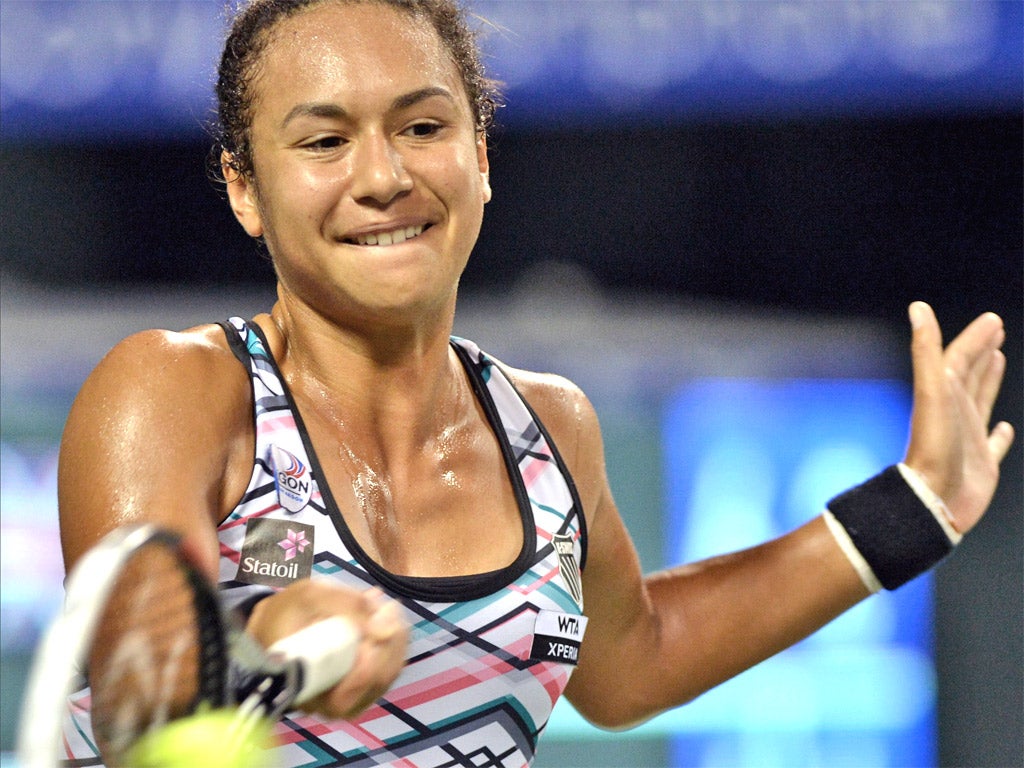Gutsy Heather Watson underlines her vast potential in defeat to Maria Sharapova
British No 2 loses tight match with Sharapova in Tokyo but still looks set for major ranking boost

Your support helps us to tell the story
From reproductive rights to climate change to Big Tech, The Independent is on the ground when the story is developing. Whether it's investigating the financials of Elon Musk's pro-Trump PAC or producing our latest documentary, 'The A Word', which shines a light on the American women fighting for reproductive rights, we know how important it is to parse out the facts from the messaging.
At such a critical moment in US history, we need reporters on the ground. Your donation allows us to keep sending journalists to speak to both sides of the story.
The Independent is trusted by Americans across the entire political spectrum. And unlike many other quality news outlets, we choose not to lock Americans out of our reporting and analysis with paywalls. We believe quality journalism should be available to everyone, paid for by those who can afford it.
Your support makes all the difference.Heather Watson's run at the Pan Pacific Open in Tokyo ended in a narrow defeat to Maria Sharapova yesterday but the 20-year-old Briton's performance underlined her growing reputation as a player who can trouble the very best.
Sharapova, the world No 2, needed more than three hours to find a way past Watson, eventually winning 6-7, 6-3, 6-4 to book her place in the third round. Although the 25-year-old Russian contributed to her own problems with 14 double-faults and 67 unforced errors, Watson also deserved credit for a gutsy performance, particularly in the first set tie-break, which she won 9-7.
It was the second time in the last 13 months that Watson has pushed Sharapova hard, having gone within six points of beating her in another three-set marathon at last year's US Open.
Watson, who had earned a place in the main draw via the qualifying tournament, could be more than satisfied with her form in Tokyo, having had a comparatively lean spell ever since she became the first British woman for 10 years to reach the third round at Wimbledon this summer. The 20-year-old from Guernsey had won only three matches in her six subsequent tournaments, though she was not helped by some tricky draws.
Having become British No 1 earlier this summer, Watson herself was overtaken last week by Laura Robson, who went on to reach the final in Guangzhou last Saturday. Robson is now No 57 in the world rankings while Watson is No 78. However, Watson should climb several places next week following her efforts in qualifying in Tokyo and her first-round victory over Sabine Lisicki.
Twelve months ago Watson finished her season playing mostly in International Tennis Federation tournaments at venues such as Shrewsbury and Barnstaple. The fact that she is tackling the Asia swing this year on the main Women's Tennis Association circuit is an indication of her progress and her ambition. This week's tournament in Tokyo and next week's in Beijing are two of the biggest outside of the Grand Slam events in terms of ranking points and the quality of the fields.
Watson began the year as the world No 92, but struggled in the early months because of an ankle injury. She had dropped to No 129 by March before beginning her climb back up the rankings in Miami. The bonus for her now is that she has few ranking points to defend over the next six months.
Both Watson and Robson will be playing next later this week at the qualifying tournament for the China Open in Beijing. The two Britons will then head for Osaka, the last leg of the Asian circuit.
Watson, at 20, is two years older than Robson. She has been based at Nick Bollettieri's academy in Florida since she was 12, while Robson has trained mostly in Britain. Watson is currently coached by the Colombian Mauricio Hadad, while Robson works with the Croat Zeljko Krajan.
If Robson's ball-striking ability marks her as an outstanding talent, Watson has always had an edge in terms of athleticism. Watson does not have the same power as Robson, but is working hard at being more aggressive, which was evident in her performance against Sharapova.
"I've been known as kind of a counterpuncher, good at moving and reading the game well, and I wanted to get to the next step, improve my game," she said. "If you want to get to the next level, you have to change things. I've been working with my coach and with Nick [Bollettieri] at being more aggressive, coming to the net."
Women on top: Watson and Robson's rise
Heather Watson
Significant ranking changes (2011)
Auckland (3 Jan) q-finals 176-149
Aus. Open (17 Jan) 2nd r rd 149-142
Memphis (13 Feb) q-f 145-130
Nassau (14 March) q-f 132-123
French Open (22 May) 2 rd 117-93
Eastbourne (13 June) 1 rd 93-106
Wimbledon (20 June) 1 rd 106-104
US Open (29 Aug) 1 rd 102-107
Quebec City (12 Sep) q-f 107-99
Shrewsbury (19 Sep) Final 99-87
Laura Robson
Significant ranking changes (2011)
Wenshan (28 Mar) q-finals 238-256
Charlottesville (25 Apr) 2 rd 256-269
Ind Har Beach (2 May) s-f 269-234
Nottingham (6 Jun) q-f 234-257
's-Hert'bosch (12 Jun) 1 rd 257-254
Wimbledon (24 Jun) 2 rd 254-184
Cincinnati (15 Aug) 1 rd 176-173
US Open (29 Aug) 2 rd 173-146
Tokyo (25 Sept) 2 rd 146-141
Beijing (1 Oct) 1 rd 141-132
Join our commenting forum
Join thought-provoking conversations, follow other Independent readers and see their replies
Comments